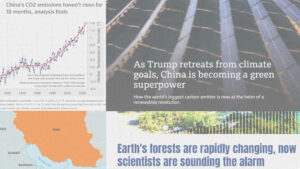Description
In this final Frankly of 2023, Nate outlines some global themes that are worth keeping an eye on in 2024. From climate change to domestic and global politics to an unstable financial system, world events continue to converge. How will the social fabric of our society respond as changes to our current way of life continue to grow? How do these seemingly isolated events interconnect and enhance each other? How will governments, businesses, and individuals respond to these circumstances as more people are propelled from the lives we’ve become used to and into an unfolding Great Simplification?
In French, we have a motto that says that a simple drawing is often better than a long explanation. Jean-Marc Jancovici Carbone 4 President
That’s very understandable because with left atmosphere thinking, one of the problems is that you see everything as a series of problems that must have solutions. Iain McGilchrist Neuroscientist and Philosopher
We can’t have hundreds and hundreds of real relationships that are healthy because that requires time and effort and full attention and awareness of being in real relationship and conversation with the other human. Nate Hagens Director of ISEOF
This is the crux of the whole problem. Individual parts of nature are more valuable than the biocomplexity of nature. Thomas Crowther Founder Restor
Show Notes & Links to Learn More
02:47 – Leon Simons, Global warming in the pipeline | Oxford Open Climate Change
03:14 – James Hansen
05:13 – Cognitive Dissonance
07:22 – Panama Canal Drought
07:46 – Suez Canal Events
09:15 – Six Continent Supply Chain
09:45 – Supernormal Stimuli
10:37 – Nate on AI
11:21 – 41% of household are ALICE
*The 40% (actually now 41%) figure is a combination of ALICE households (29%) and folks below the Federal Poverty Level (12%) as noted on the attached graphic from the 2023 national United for ALICE report. Of those households below the FPL, only about 50% are employed.
13:36 – Financial Policies from the Recession that are still in place, rising national debt levels, Bank of Japan buying its own debt







